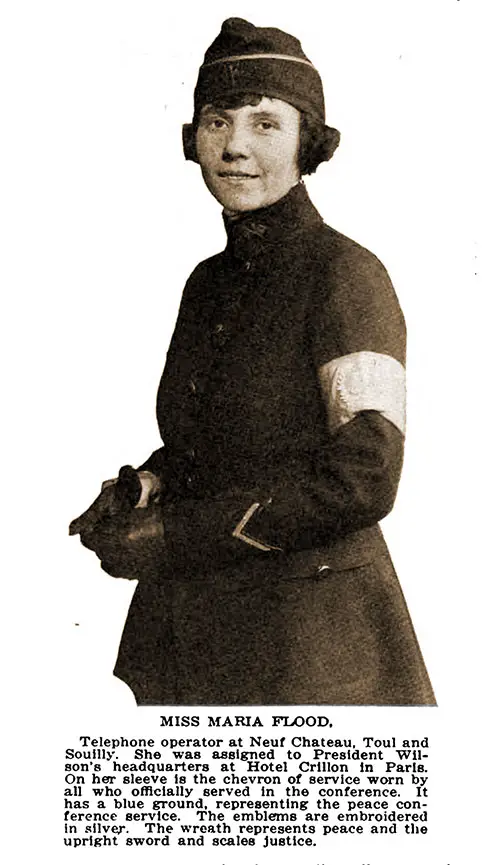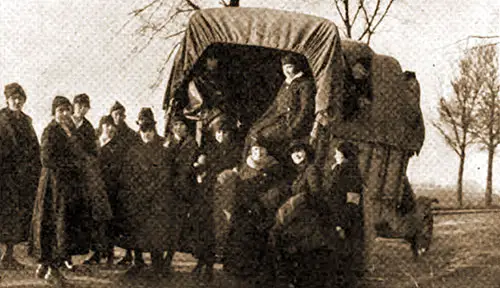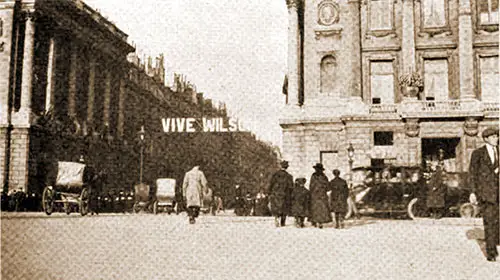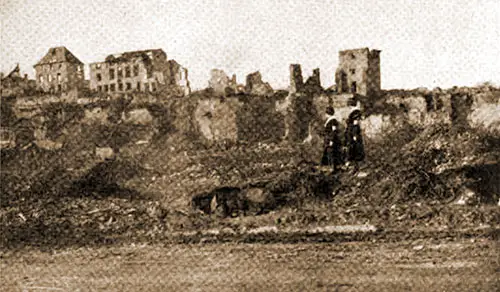With an American Telephone Girl in France - 1919
Miss Maria Flood, Chicago Girl, Just Home from Over There, Writes Exclusive Article for Bell Telephone News.

Miss Maria Flood, Telephone Operator at Neufchateau, Toul and Souilly. She Was Assigned to President Wilson's Headquarters at Hotel Crillon in Paris. On Her Sleeve Is the Chevron of Service Worn by All Who Officially Served in the Conference. It Has a Blue Ground, Representing the Peace Conference Service. The Emblems Are Embroidered in Silver. the Wreath Represents Peace and the Upright Sword and Scales Justice. Bell Telephone News, May 1919. GGA Image ID # 19a6febee9
We were all on tiptoe from the time we sailed from New York until we arrived in Tours—to find out just what our luck would be as to where we were to be stationed.
Of course “the front” meant Heaven to us, and one and all implored the captain in charge to send us just as near that “Heaven” as he possibly could.
My great joy can be imagined when I was told that I was to be one of the seven to go to Neufchateau Vosges to open the office. We stopped in Chaumont long enough to get our chief operator and supervisor, and then we were off.
We found there two camp boards and a two-position magneto local board of the vintage of eighteen eighty and of French make. For a week it was bedlam—but order soon reigned, and the work became manageable.
Our chief operator, Miss Elsie Hunter of Medford, Mass., was on the job every minute and we all liked her tremendously.
I think I’m safe in saying we didn’t waste a second. The boards were awful—needless to say. Although they worked on the lines continuously, those going North were being constantly shattered by bombs and gun firing.
At times we felt discouraged. But when we thought how hard the boys were fighting and how bravely they were giving up their lives, we felt that though we were so tired we could scarcely move we could never be a millionth part as tired and as brave as they.
We knew that each and every call was of vast importance and more calls than we dared to think of meant life or death to our boys in No Man’s Land.

Signal Corps Telephone Operators Are Ready for a Long Ride across Country. This Picture Shows Miss Flood and Some of Her Companion Operators and Army Trucks in Which They Took the Long Journey Described in Her Letter. Their Smiling Faces Give Testimony That They Felt No Ill Will at Things in General, Although They Probably Enjoyed Little Comfort on the Trip. Bell Telephone News, May 1919. GGA Image ID # 19a71961b4
We also had to be discreet about everything we said outside of the office. Any careless word might give information to the enemy and we had to feel that the very person we liked the most was not to be trusted. We had to watch our codes and see that any message we might he called on to take was taken immediately.
At first the French central gave us a great deal of trouble, but after we had become acquainted and had bribed them with a few tins of chocolates we came to a better understanding.
Their system is funny. The men of the French central liked to get the American girls on the line, so much so that if we called for a circuit that was busy, they would cut the line without giving any notice to the two irritable French colonels that might be talking and give it to us with a proud “Voila Mademoiselle.'’
Once after a long, hard debate with a million French centrals we drew a breath of relief as two chiefs of staff started their “Preferred1 Service Call.”
Just then the French central cut them off and announced in a very high and mighty voice that she had Brest on the line for us. When we tried to remonstrate with her, she informed us that she did not have Brest in her pocket and" if we wanted it we’d take it now. With that she left the line, and no amount of ringing would bring her back again.
At first, we didn’t understand the Englishmen when we challenged “Are you waiting—are you through”—they would answer “Yes.” About five minutes later the recorder would hear this wail. “Oh, miss, you’ve cut me off from Paris.”
We would explain why we had disconnected and then they would say, “Yes, miss, I was through, but I wasn’t finished.” It’s all in the way you look at it and we soon saw that he was through to Paris but not, as he said, finished.
A call canceled was “washed out” according to English phraseology. We soon could “parley vous” Anglais as well as they—and the girl who has the London board at Belle Epine can now converse in the English operators’ own language.
The British girls are quite proud to show us that they know our phrases and we often hear “Are you waiting?” instead of “Hello, are you theah?”
We were bombed once in Neufchateau, and once the Boche flew over and We were bombed once in Neufchateau, and once the Boche flew over and emptied a machine gun into the town.
They came several other times with propaganda balloons but did no damage. Fritzie also liked to take pictures—this- always happened in the daytime. It was then up to us to telephone the warning to the aero stations.
It was often necessary to take messages in code and in French to be delivered in English and vice versa.
Our office gradually grew in positions and operators but not in space. Though it was very fine, we seven loved the smaller office and missed it very much. When the Second Army Headquarters were established at Toul I was separated from my best friends.
Two weeks later I was transferred to the Second" Army, much to my joy. Miss Hunter received me with open arms. But she wasn’t to hold me for long.
A message came that Miss Flood and Miss Beraud, also trained in Chicago, were to return to Neufchateau immediately and from there to proceed to Souilly, First Army Headquarters.
Then came the most awful trip one can imagine—we were on our way from Neufchateau to Souilly from six in the evening until half past three the next morning.
We were in an open car, the rain pouring down, and as we had had very little time to eat that day we were all famished. We stopped at Signy en Barrois at midnight and had sandwiches and coffee—remember it was army coffee, no sugar and no milk, but it was hot and it tasted like nectar to us.
Several weeks of the most strenuous work followed. We were burned out very shortly after we arrived, and the last part of our stay there meant we had to bunk most any way.
It was terribly hard, and after so many months of work we were tired, but I'm glad I had it. The girls were fine and each and every one worked like true soldiers.
We were the only central in the town—that meant we were the French central and also the switching point for the French. My position had all the lines going to the trenches. They were constantly being shattered.
We never knew just where “Lakewood” would come in the next minute or where “Cherry” had gone. We had to test the lines every hour. Traffic going South was surely congested—we had so very few lines and the French had to use them too.
Our code name was “Wide-wing.” Many people were careless about these code names. We would often hear “Hello, Souilly, give me “White-wing,” which being one and the same thing was impossible.
After the armistice we had a great deal of work to do. We were not able to move to the First Army Rest Camp at Bar Sur Aube until the end of November.
From Bar Sur Aube we all went to Nice on our leaves, but unfortunately, we came down with influenza. Our long looked for leave was spent in bed.

The Hotel Crillon, Paris. Miss Flood Was One of the Telephone Operators Stationed at This Hotel, Where All of the American Peace Commissioners, with the Exception of President Wilson, Are Quartered. The Clerks, Military and Naval Attachés and Others Connected Officially with the American Peace Delegation, Also Live in This Hotel. It Can Easily Be Imagined That an Operator on Duty Here Would Have Plenty of Interesting and Important Work. Bell Telephone News, May 1919. GGA Image ID # 19a72643a1
After that came Paris and the peace conference at the Hotel Crillon. The girls work in the old bar room! The walls are paneled in bird’s eye maple. There are large mirrors everywhere and velvet hangings. It is truly luxury to us. It is all local work for Colonel House’s Mission.
The reason so many things were said in the newspapers about my not listening in is this: When we arrived in New York the reporter who was interviewing remarked, “I suppose you know everything that goes on over the wires of the peace conference.”
I said, “No, I have never listened in since I’ve been in France.” He didn’t seem to believe me and said, “I’ll bet you wouldn’t cross your heart on that,” and wasn’t I proud to be able to cross my heart on it!
We were on our honor, and then again, we often said, “the less we knew the less we had to tell.”

American Telephone Girls View Historic Ruins of Chateau Thierry. This Is Another Interesting: Picture Brought to America by Miss Flood. All the Girls Had Colorful Experiences Which Were Worth All the Inconveniences and Dangers through Which They Passed. the Picture Itself, aside from the Fact That It Was Brought by Miss Flood, Is Noteworthy as Showing the Terrible Effect of the Tide of Battle Which Swept over This Little City in the Fateful Months of 1918. Bell Telephone News, May 1919. GGA Image ID # 19a75c5eb5
I’m finishing this little article by a funny little letter that a French telephone girl sent me:
Dear Miss:
Excuse me to write without knowing you, but I like very much American language and I desire learn better. You will be very amiable to accept an exchange of letters and you would come at home perhaps for conversation, the Sunday for instance. I wish I could speak well but I don’t know, and the conversation is more useful than correspondence. I am at your disposal to teach French to you. It will be more interesting. You will write French letters if you like.
Many thanks for your kindness, and I am, Dear Miss,
Yours truly,
S. Praupenoit.
When the call came for telephone operators to volunteer for service overseas, there were many ready to respond to the call.
Miss Flood, formerly an operator in the Chicago Telephone Company and for a time with the Long Lines service in Chicago, was particularly well qualified for this service, because of her education and knowledge and French.
Besides this she had a courageous spirit which could not be easily discouraged, a sense of humor and quick wit, which could carry her through discomfort and unusual emergencies. She took her preparatory training for over sea service in the Chicago Telephone Training Department.
The reporters have fabricated stories about her experiences and made-up romances of their own, but the Bell Telephone News is able to give our girls a true story written by her own hand.
Maria Flood, “With an American Telephone Girl in France,” in Bell Telephone News, Detroit Edition, Vol. 8, No. 10, May 1919, pp, 22-23.
